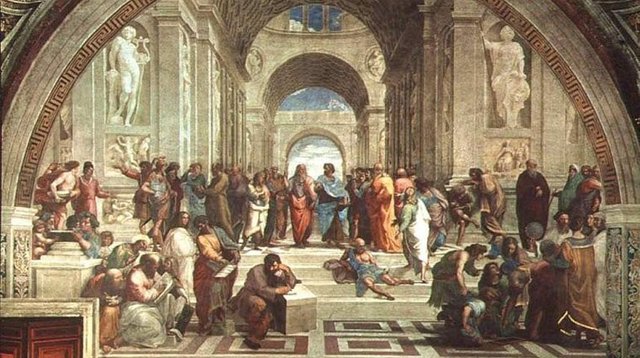Another very important aspect in Aristotle's philosophy is that it does not contradict the subjective thinking of the objective external reality, but on the contrary, teaches that the same law rule both inside and outside. On this basic belief, Aristotle's logic is built up, so it is never a formal one, referring only to the form of thinking, but at the same time an expression of the natural normality - it is a subject. Aristotle further does not oppose his theoretical knowledge of the practical, however clearly aware of their difference. To him, the theoretical, naturally and slightly, grows in necessity in practice, and vice versa, the practice grows into theoretical knowledge.
They are not artificially divided and opposed, but on the contrary, they are checked, supplemented and fertilized.Finally, Aristotle does not oppose logical knowledge and contemplation of faith and reason. Being a genius scientist, he also clearly sees that the immediate touch between inner and outer law takes place at the highest points where we do not need any scientific evidence, but only contemplate and directly experience the obvious. These are the points of the axioms, the self-evidentness of the equivocation. They are basic prerequisites for any science, and they are immediately credible. For such axioms, Aristotle points to the Controversy Law, the Excluded Third Act, and so on.
Aristotle's logic
Aristotle is the father of logic. It is precisely because it considers it / organon / - armament, way, manual. For any scientific activity, he says that only pre-knowledge can be useful, because only after the analytics have been learned can the philosophy of philosophy go, but not the opposite - "once the philosophizing has begun, let us pursue the elementary ". Taking on its meaning, Aristotle puts on his genius to study and establish it completely.
And it does so in such perfection that 2000 years later, Kant in the preface to the second edition of "Critique of Pure Reason" complains that from Aristotle's logic really did not take a step back, but unfortunately did not a step ahead. Indeed, this is due to the very nature of the logical truths that, like the mathematical ones, are not developing, but it is also due to the genius of Aristotle, who himself, with only a little previous experience of humanity in this field suddenly builds this science in full and almost volume, because the added is then quite insignificant. Aristotle calls the logic analyst for two reasons: firstly, because his main method is to analyze, divide the things into separate marks, and separate the essential from the non-essential ones, and second, because its ultimate goal is to achieve precise, clear and lasting notions , without which scientific knowledge is impossible, and this is obtained when complex speech is analyzed and divided into separate judgments, and they in turn of concepts.

for me the Aristotelian logic starts from the assumption that thought forms reproduce what happens in reality.
Downvoting a post can decrease pending rewards and make it less visible. Common reasons:
Submit